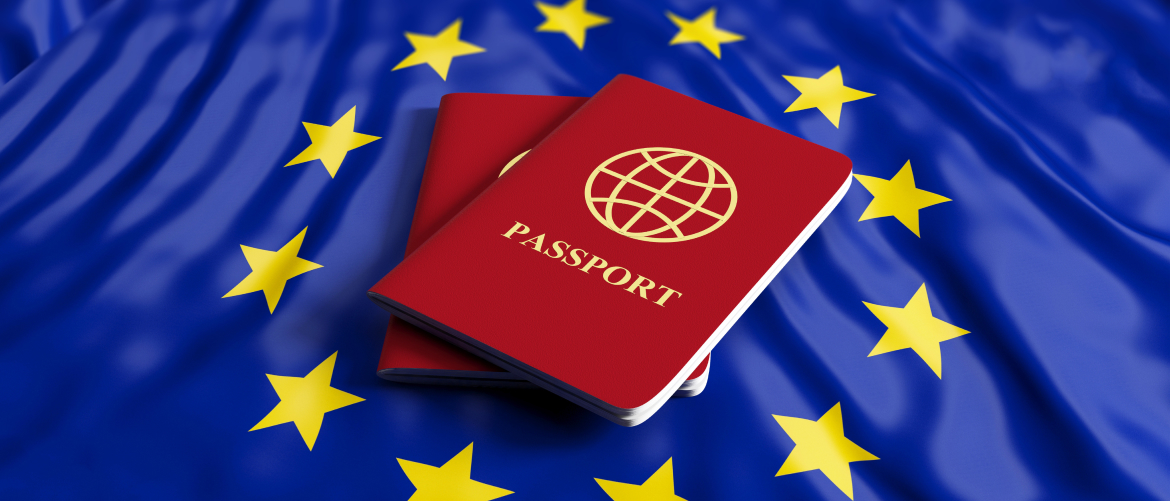EU citizenship: how to get the status of a citizen in a European country

How to get EU citizenship with all the privileges
EU citizenship is a legal bond between an individual and an association of states. The holder of a passport of any of the 27 countries of the European Union automatically acquires this status in addition to the citizenship of his country. The norms for granting national rights in the EU are governed by a single “European Convention on Citizenship” and the constitutions of each of the states.
European citizenship (of the EU state) is a status that gives its owner the opportunity to live in any of the countries on the territory of the association without time limits, use the services of banks and medical institutions, find a job, study, do business, buy land and real estate. With an EU passport, a foreigner can choose any of the states of the agreement as a place of permanent residence.
What does the EU citizenship give?
- Residence in the EU
A foreigner can permanently reside in any of the countries of the association or travel within the territory of the European Union without time limits.
- Access to the labor market and education
An immigrant has the right to find a job on the equal conditions with the indigenous population of the chosen country, as well as apply for free education in EU universities.
- Access to the Single European Market
With an EU passport, the applicant has the right to register a business or buy an existing enterprise with international development prospects on one of the largest trading platforms on the planet.
- Change of tax residency
After six months of stay in the selected country, the applicant has the right to pay the necessary payments to the local treasury, waiving similar government fees in his home country. The main condition is the existence of a signed convention “On the avoidance of double taxation” between the current and previous state of permanent residence.
- Quality medical care
An immigrant can receive qualified assistance from professional doctors in the best clinics of the European Union, including free services provided by law (for example, calling an emergency).
- Visa-free travel around the world
Depending on the passport, a citizen of the European Union can visit 167-173 countries without obtaining an entry permit. Also, the presence of an EU ID card increases the chances of an immigrant to obtain a visa to the United States or China. ● Services of banking institutions
An immigrant with citizenship of European countries (EU) has the right to open a deposit or credit account, apply for a mortgage loan, rent a safe deposit box in the most reliable banks in the Commonwealth with favorable rates intended for the indigenous population.
- Social support
The European Convention provides for the protection of the national rights of every citizen of the Commonwealth. With an EU passport, an immigrant has the right to count on the benefits and allowances prescribed by law, participation in tenders, registration of grants and scholarships, assistance from law enforcement agencies.
How to obtain EU citizenship: options
The legislation regulates three main ways to obtain EU citizenship:
- Naturalization
An immigrant who legally (with a residence permit or permanent residence) resides in the territory of the chosen country for a period established by the constitution (usually from 3 to 10 years) can become a naturalized citizen. The applicant must also meet other requirements – knowledge of the state language, the presence of a permanent income, good criminal record.
The applicant moves to the EU, having obtained residence for one of the legal grounds – for example, employment, education, family reunification. If necessary, an immigrant extends a residence permit and / or applies for permanent residence, and, after a set period, receives a European Union passport. Naturalization can be accelerated – for example, for spouses of local citizens.
- Repatriation
The procedure for the restoration of national rights allows former citizens of the respective country of association and their direct descendants to obtain an EU passport in a simplified manner. The main requirement for the applicant is documentary evidence of ethnic or territorial affiliation to the state.
Repatriates do not need to first reside in the chosen country, demonstrate the level of income or availability of housing, and have a thorough knowledge of the state language. It takes up to a year and a half for the applicant to obtain the requested status (with the support of migration specialists).
- Investments
A number of European states provide for accelerated granting of local citizenship to persons for a special financial contribution to the economy. For example, an investor who has invested more than 1,000,000 EUR in assets in Romania can obtain an EU passport in just 4 years instead of the standard 8. Bulgaria provides local permanent residence for investments from 512,000 EUR in certain areas, with which the naturalization period is reduced from 10 to 5 years. The amount of financial subsidies and requirements for an immigrant depend on the legislation of the respective country.
In some states (for example, Latvia and Greece), investments are the basis for issuing a residence permit, with which the applicant can move to Europe and later apply for citizenship under the general conditions of naturalization.
Where in Europe it is possible to get a citizenship?
A foreigner can apply for citizenship of the European Union in any country of association. However, states provide for various immigration programs and naturalization periods for applicants. Information on how long it takes to legalize in an EU country is presented in the table below.
| A way to obtain citizenship | Average terms in the EU |
| Naturalization | 5–10 years |
| Investments | 4–8 years |
| Repatriation | 1–2 years |
Courtiers with the best programs
To obtain citizenship of a European country (more precisely, the EU), residents of the states of the post-Soviet space most often choose the following countries:
- Romania;
- Poland;
- Bulgaria;
- France;
- Spain.
Many immigrants also move to Italy, Austria, Slovenia, Germany, the Republic of Cyprus for permanent residence and subsequently apply for citizenship.
Romania
Romania has a repatriation program that allows former citizens of the country and their descendants up to 3 generations (including great-grandchildren) to obtain an EU passport in just 12-18 months. When restoring national status, not only blood ties are taken into account, but also territorial affiliation to the state. Descendants of persons who lived in the Kingdom of Greater Romania before 1940 can apply for EU citizenship. Many regions of this state today belong to Ukraine and Moldova. Repatriates do not need to confirm the level of income, pay state fees and take an exam for knowledge of the state language and customs.
Poland
Foreigners can apply for a Pole’s card, which is issued to persons according to their blood affiliation to the local people, or for special services to the state. The document gives the holder the opportunity to immigrate to Poland, obtain local permanent residence, apply for social benefits, assistance with employment and integration. After 12 months of legal residence in the country, an immigrant has the right to request an EU passport. To apply for a Pole’s card, the applicant must confirm knowledge of and respect for the local culture, history, language, customs, and values. The term for consideration of the request is from 3 months, the state duty is not provided.
Bulgaria
Registration of an EU passport in Bulgaria is available for former citizens of the country and their descendants, including great-grandchildren. The applicant confirms the ethnicity of the people of the republic with documents – for example, a certificate of birth, death, marriage, divorce. It takes from 9-15 months to consider the request with the participation of European law experts. An immigrant can keep the first identity card, and is not obliged to confirm knowledge of the Bulgarian language and culture. There is no state fee for obtaining EU citizenship for repatriation in Bulgaria.
France
Immigrants often apply for an EU passport under the general naturalization procedure after legally moving to France under the French Tech Visa program. The state attracts investors and promising start-up entrepreneurs who can apply for a special residence permit – passeport talent.
Immigration is possible even without special financial costs, if the foreigner’s business idea is supported and sponsored by local licensed accelerators, venture firms. The applicant is also not required to confirm the proper experience in the chosen field with a diploma. The minimum investment threshold for those wishing to open their own company without outside help is 30,000 EUR.
Passeport talent is issued to the applicant immediately for 4 years with the possibility of extension, and allows to legally immigrate with a family, whose members also receive a local residence permit with a work permit and access to education. After 5 years of legal stay in France, a foreigner can apply for an EU passport by naturalization.
Spain
The Spanish state provides a residence card to applicants when buying property that costs from 500,000 EUR. Immigrants take the opportunity to purchase a residential or commercial property in a country with developed tourism, and subsequently live in it or use it to generate passive income. Also, persons planning to open a business that is beneficial for the economy and the development of the state can apply for a residence permit, and the minimum authorized capital is not regulated by law. A temporary residence permit is valid for a year with the possibility of renewal. After 5 years, an immigrant can obtain permanent residence, after another 60 months – an EU passport.
Spain is one of the few countries in the European Union where it is possible to accelerate the acquisition of citizenship for children of foreigners. A child who was born on the territory of the kingdom in a family of legal immigrants first obtains a residence permit or permanent residence (depending on the status of the parents), and after 12 months has the right to apply for a local passport.
Dual citizenship in Europe
Agreements on dual citizenship in Europe have been concluded in several EU countries – for example, between Portugal and Brazil, Spain and a number of South American states. The presence of dual citizenship allows the applicant to choose the place of fulfillment of constitutional duties (military service, payment of taxes), to enjoy the relevant rights in each of the countries. There are no such conventions between the states of the post-Soviet space and the European Union for 2023.
The ability to keep the first identity card when applying for a second EU passport is regulated by the legislation of each member state of the association. Most European countries do not require applicants to renounce their first citizenship, but there are exceptions – for example, Germany. Requirements for renunciation of previous national status may depend on the basis on which an immigrant issues an EU passport: for example, Bulgaria, Romania and Poland allow returnees to keep both identity cards.
When obtaining a second citizenship, the applicant must take into account the laws of his native country. For Ukrainians, no consent or informing the local migration authorities about the issuance of an EU passport is required. Things are different for Russians and Belarusians: an immigrant must notify a department of the Ministry of Internal Affairs or a diplomatic mission abroad within 60 days or 3 months, respectively, of obtaining national status in another state.
Fallacies about EU citizenship
Citizenship of the European Union cannot be bought legally, including through investment. Previously valid “golden passport” programs in Malta and Cyprus have been closed due to a violation of the association’s migration policy. Fictitious marriage in the territory of the European Union is an illegal way to obtain citizenship. If such violations are detected, an immigrant can be arrested, fined, deported from the country with a ban on re-visiting EU countries.
The birth of a child in Europe (on the territory of the EU) is not a basis for obtaining local citizenship. In a number of countries (for example, Portugal and Greece), it is possible to issue a passport for the children of immigrants who legally reside in the state with a permanent residence card or residence permit for at least 3-5 years prior to the application.
Refugees and applicants for international protection do not have special privileges when applying for a European Union passport. Also, when obtaining a residence permit for humanitarian reasons, applicants are deprived of a valid identity card and, as a rule, are prohibited from visiting their home country. An immigrant can obtain EU citizenship through refugee within the framework of naturalization (regular or reduced, depending on the laws of a particular state).
EU citizens are not limited in the right to choose their place of residence throughout the agreement. However, the applicant must contact the migration authorities or the police to register on arrival and issue a local resident card.
Frequently asked questions
The cheapest EU citizenship
For foreigners, a cheap option for obtaining citizenship of the European Union is the repatriation program – in Poland, Romania, Bulgaria, in which the immigrant does not require special financial investments.
In which EU country is it easier to obtain citizenship?
According to the feedback of immigrants, the easiest way to obtain EU citizenship is through the repatriation program, which is provided for in several states of the association. It is easier for residents of the post-Soviet countries (including Russians) to obtain an EU passport based on their roots in Romania, Poland, Bulgaria, and Slovenia.
Where to give birth to a child to obtain EU citizenship?
In the countries of the European Union, the right of soil (through childbirth) is not provided: a child born in a family of foreigners receives the citizenship of the mother or father.
How much does the EU citizenship cost?
The cheapest issuance of a European Union passport with the support of migration specialists will cost the applicant 3300 EUR or more, depending on the situation.
Is it possible to buy an EU citizenship?
It is impossible to legally buy EU citizenship in any of the countries of the association. Certain states (for example, Cyprus and Romania) provide a local passport for investment in the accelerated naturalization process.




